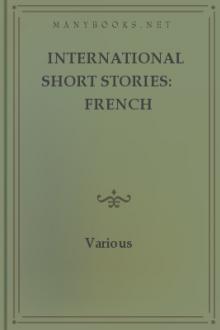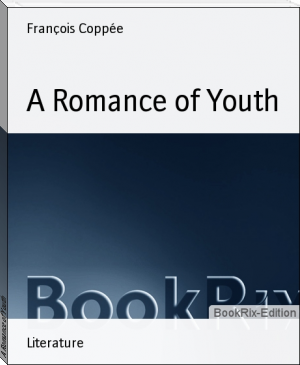International Short Stories: French, - [best ebook reader ubuntu txt] 📗

- Author: -
- Performer: -
Book online «International Short Stories: French, - [best ebook reader ubuntu txt] 📗». Author -
In two days the abscess broke of its own accord and Zadig was perfectly cured. Hermes wrote a book to prove that it ought not to have been cured. Zadig did not read it; but, as soon as he was able to go abroad, he went to pay a visit to her in whom all his hopes of happiness were centered, and for whose sake alone he wished to have eyes. Semira had been in the country for three days past. He learned on the road that that fine lady, having openly declared that she had an unconquerable aversion to one-eyed men, had the night before given her hand to Orcan. At this news he fell speechless to the ground. His sorrow brought him almost to the brink of the grave. He was long indisposed; but reason at last got the better of his affliction, and the severity of his fate served to console him.
“Since,” said he, “I have suffered so much from the cruel caprice of a woman educated at court, I must now think of marrying the daughter of a citizen.” He pitched upon Azora, a lady of the greatest prudence, and of the best family in town. He married her and lived with her for three months in all the delights of the most tender union. He only observed that she had a little levity; and was too apt to find that those young men who had the most handsome persons were likewise possessed of most wit and virtue.
THE NOSEOne morning Azora returned from a walk in a terrible passion, and uttering the most violent exclamations. “What aileth thee,” said he, “my dear spouse? What is it that can thus have discomposed thee?”
“Alas,” said she, “thou wouldst be as much enraged as I am hadst thou seen what I have just beheld. I have been to comfort the young widow Cosrou, who, within these two days, hath raised a tomb to her young husband, near the rivulet that washes the skirts of this meadow. She vowed to heaven, in the bitterness of her grief, to remain at this tomb while the water of the rivulet should continue to run near it.”—“Well,” said Zadig, “she is an excellent woman, and loved her husband with the most sincere affection.”
“Ah,” replied Azora, “didst thou but know in what she was employed when I went to wait upon her!”
“In what, pray, beautiful Azora? Was she turning the course of the rivulet?”
Azora broke out into such long invectives and loaded the young widow with such bitter reproaches, that Zadig was far from being pleased with this ostentation of virtue.
Zadig had a friend named Cador, one of those young men in whom his wife discovered more probity and merit than in others. He made him his confidant, and secured his fidelity as much as possible by a considerable present. Azora, having passed two days with a friend in the country, returned home on the third. The servants told her, with tears in their eyes, that her husband died suddenly the night before; that they were afraid to send her an account of this mournful event; and that they had just been depositing his corpse in the tomb of his ancestors, at the end of the garden.
She wept, she tore her hair, and swore she would follow him to the grave.
In the evening Cador begged leave to wait upon her, and joined his tears with hers. Next day they wept less, and dined together. Cador told her that his friend had left him the greatest part of his estate; and that he should think himself extremely happy in sharing his fortune with her. The lady wept, fell into a passion, and at last became more mild and gentle. They sat longer at supper than at dinner. They now talked with greater confidence. Azora praised the deceased; but owned that he had many failings from which Cador was free.
During supper Cador complained of a violent pain in his side. The lady, greatly concerned, and eager to serve him, caused all kinds of essences to be brought, with which she anointed him, to try if some of them might not possibly ease him of his pain. She lamented that the great Hermes was not still in Babylon. She even condescended to touch the side in which Cador felt such exquisite pain.
“Art thou subject to this cruel disorder?” said she to him with a compassionate air.
“It sometimes brings me,” replied Cador, “to the brink of the grave; and there is but one remedy that can give me relief, and that is to apply to my side the nose of a man who is lately dead.”
“A strange remedy, indeed!” said Azora.
“Not more strange,” replied he, “than the sachels of Arnon against the apoplexy.” This reason, added to the great merit of the young man, at last determined the lady.
“After all,” says she, “when my husband shall cross the bridge Tchinavar, in his journey to the other world, the angel Asrael will not refuse him a passage because his nose is a little shorter in the second life than it was in the first.” She then took a razor, went to her husband’s tomb, bedewed it with her tears, and drew near to cut off the nose of Zadig, whom she found extended at full length in the tomb. Zadig arose, holding his nose with one hand, and, putting back the razor with the other, “Madam,” said he, “don’t exclaim so violently against young Cosrou; the project of cutting off my nose is equal to that of turning the course of a rivulet.” Zadig found by experience that the first month of marriage, as it is written in the book of Zend, is the moon of honey, and that the second is the moon of wormwood. He was some time after obliged to repudiate Azora, who became too difficult to be pleased; and he then sought for happiness in the study of nature. “No man,” said he, “can be happier than a philosopher who reads in this great book which God hath placed before our eyes. The truths he discovers are his own; he nourishes and exalts his soul; he lives in peace; he fears nothing from men; and his tender spouse will not come to cut off his nose.”
Possessed of these ideas he retired to a country house on the banks of the Euphrates. There he did not employ himself in calculating how many inches of water flow in a second of time under the arches of a bridge, or whether there fell a cube line of rain in the month of the Mouse more than in the month of the Sheep. He never dreamed of making silk of cobwebs, or porcelain of broken bottles; but he chiefly studied the properties of plants and animals; and soon acquired a sagacity that made him discover a thousand differences where other men see nothing but uniformity.
One day, as he was walking near a little wood, he saw one of the queen’s eunuchs running toward him, followed by several officers, who appeared to be in great perplexity, and who ran to and fro like men distracted, eagerly searching for something they had lost of great value. “Young man,” said the first eunuch, “hast thou seen the queen’s dog?” “It is a female,” replied Zadig. “Thou art in the right,” returned the first eunuch. “It is a very small she spaniel,” added Zadig; “she has lately whelped; she limps on the left forefoot, and has very long ears.” “Thou hast seen her,” said the first eunuch, quite out of breath. “No,” replied Zadig, “I have not seen her, nor did I so much as know that the queen had a dog.”
Exactly at the same time, by one of the common freaks of fortune, the finest horse in the king’s stable had escaped from the jockey in the plains of Babylon. The principal huntsman and all the other officers ran after him with as much eagerness and anxiety as the first eunuch had done after the spaniel. The principal huntsman addressed himself to Zadig, and asked him if he had not seen the king’s horse passing by. “He is the fleetest horse in the king’s stable,” replied Zadig; “he is five feet high, with very small hoofs, and a tail three feet and a half in length; the studs on his bit are gold of twenty-three carats, and his shoes are silver of eleven pennyweights.” “What way did he take? where is he?” demanded the chief huntsman. “I have not seen him,” replied Zadig, “and never heard talk of him before.”
The principal huntsman and the first eunuch never doubted but that Zadig had stolen the king’s horse and the queen’s spaniel. They therefore had him conducted before the assembly of the grand desterham, who condemned him to the knout, and to spend the rest of his days in Siberia. Hardly was the sentence passed when the horse and the spaniel were both found. The judges were reduced to the disagreeable necessity of reversing their sentence; but they condemned Zadig to pay four hundred ounces of gold for having said that he had not seen what he had seen. This fine he was obliged to pay; after which he was permitted to plead his cause before the counsel of the grand desterham, when he spoke to the following effect:
“Ye stars of justice, abyss of sciences, mirrors of truth, who have the weight of lead, the hardness of iron, the splendor of the diamond, and many properties of gold: Since I am permitted to speak before this august assembly, I swear to you by Oramades that I have never seen the queen’s respectable spaniel, nor the sacred horse of the king of kings. The truth of the matter was as follows: I was walking toward the little wood, where I afterwards met the venerable eunuch, and the most illustrious chief huntsman. I observed on the sand the traces of an animal, and could easily perceive them to be those of a little dog. The light and long furrows impressed on little eminences of sand between the marks of the paws plainly discovered that it was a female, whose dugs were hanging down, and that therefore she must have whelped a few days before. Other traces of a different kind, that always appeared to have gently brushed the surface of the sand near the marks of the forefeet, showed me that she had very long ears; and as I remarked that there was always a slighter impression made on the sand by one foot than the other three, I found that the spaniel of our august queen was a little lame, if I may be allowed the expression.
“With regard to the horse of the king of kings, you will be pleased to know that, walking in the lanes of this wood, I observed the marks of a horse’s shoes, all at equal distances. This must be a horse, said I to myself, that gallops excellently. The dust on the trees in the road that was but seven feet wide was a little brushed off, at the distance of three feet and a half from the middle of the road.





Comments (0)